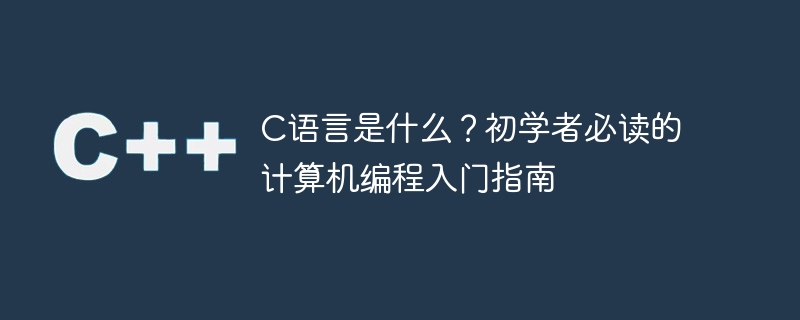
C language is a computer programming language developed by Bell Laboratories in the United States in the early 1970s. C language is famous for its simplicity, efficiency and portability, and is widely used in the development of operating systems, embedded systems and various applications. For beginners, learning C language is one of the first choices for learning computer programming, because it not only provides a programming foundation, but also lays a solid foundation for subsequent learning of other programming languages.
In order to help beginners better understand and learn C language, some important concepts and techniques will be introduced below:
- Data types and variables: In C language, variables must Declare first and then use. The type of variable needs to be specified when declaring, such as integer (int), character (char), floating point number (float), etc. Variable names should be descriptive, easy to understand, and adhere to naming conventions.
- Control structure: Commonly used control structures in C language include conditional statements and loop statements. Conditional statements (such as if-else statements) are used to execute different blocks of code based on conditions, and loop statements (such as for loops, while loops) are used to repeatedly execute a block of code.
- Array: An array is a collection that stores the same type of data and can be used to store multiple elements. When declaring an array, you need to specify the type of elements and the size of the array. The index of the array starts from 0, and the elements in the array can be accessed and modified through the index.
- Function: A function is an independent block of code used to complete a specific task. In C language, a function usually contains a function header, function body and return statement. The definition of functions can encapsulate repeated code blocks and improve code reusability.
- Pointer: Pointer is an important concept in C language. It is used to store the memory address of a variable. Pointers can directly access and modify the value of variables, and can also dynamically allocate memory. Pointers are a relatively complex concept in C language, and beginners may need some time to understand and master them.
- Input and output: C language provides a variety of input and output functions for reading user input from the keyboard and outputting results to the screen. Commonly used input functions include scanf() and getchar(), and output functions include printf() and putchar(). Mastering the use of input and output functions can make programming more flexible and interactive.
In the process of learning C language, it is recommended that beginners write more codes and deepen their understanding of C language through practice. You can start with simple programs and gradually increase the difficulty. When you encounter problems, you can refer to C language learning materials and forums, ask others for advice, solve problems, and continuously improve your programming skills.
In addition, there are some tips for learning C language worth noting:
- Comments: When writing code, you can use comments to explain the code function, variable usage, etc. Comments can improve the readability of the code and make it easier for others to read and understand.
- Debug the program: When encountering a program error, you can use debugging tools to locate and solve the problem. In C language, you can use a debugger (such as gdb) for single-step debugging and observe the values of variables and program execution flow.
- Reference documents: C language has many excellent learning materials and reference documents for learners to refer to. Beginners can choose the teaching materials and video tutorials that suit themselves and follow the tutorials step by step.
Finally, learning C language requires patience and persistence, and don’t be afraid of encountering difficulties and challenges. Through continuous learning and practice, I believe you can master the programming skills of C language and become an excellent programmer. I wish all beginners success in learning C language!
The above is the detailed content of Discover C: A Beginner's Guide to Computer Programming. For more information, please follow other related articles on the PHP Chinese website!






